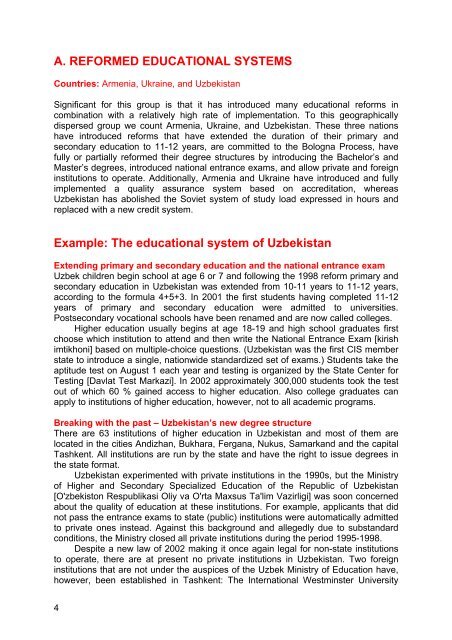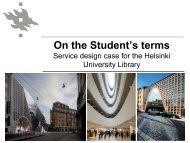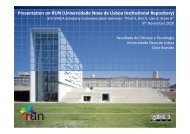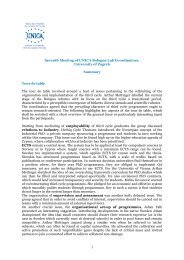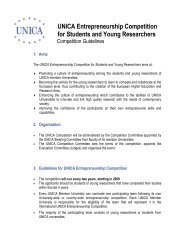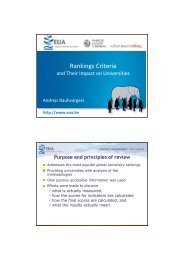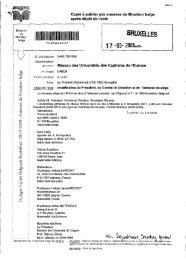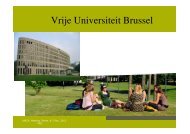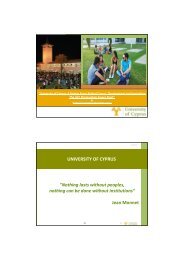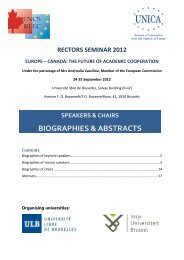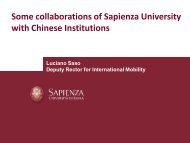Reforming the educational systems of the former Soviet Union - UNICA
Reforming the educational systems of the former Soviet Union - UNICA
Reforming the educational systems of the former Soviet Union - UNICA
Create successful ePaper yourself
Turn your PDF publications into a flip-book with our unique Google optimized e-Paper software.
A. REFORMED EDUCATIONAL SYSTEMS<br />
Countries: Armenia, Ukraine, and Uzbekistan<br />
Significant for this group is that it has introduced many <strong>educational</strong> reforms in<br />
combination with a relatively high rate <strong>of</strong> implementation. To this geographically<br />
dispersed group we count Armenia, Ukraine, and Uzbekistan. These three nations<br />
have introduced reforms that have extended <strong>the</strong> duration <strong>of</strong> <strong>the</strong>ir primary and<br />
secondary education to 11-12 years, are committed to <strong>the</strong> Bologna Process, have<br />
fully or partially reformed <strong>the</strong>ir degree structures by introducing <strong>the</strong> Bachelor’s and<br />
Master’s degrees, introduced national entrance exams, and allow private and foreign<br />
institutions to operate. Additionally, Armenia and Ukraine have introduced and fully<br />
implemented a quality assurance system based on accreditation, whereas<br />
Uzbekistan has abolished <strong>the</strong> <strong>Soviet</strong> system <strong>of</strong> study load expressed in hours and<br />
replaced with a new credit system.<br />
Example: The <strong>educational</strong> system <strong>of</strong> Uzbekistan<br />
Extending primary and secondary education and <strong>the</strong> national entrance exam<br />
Uzbek children begin school at age 6 or 7 and following <strong>the</strong> 1998 reform primary and<br />
secondary education in Uzbekistan was extended from 10-11 years to 11-12 years,<br />
according to <strong>the</strong> formula 4+5+3. In 2001 <strong>the</strong> first students having completed 11-12<br />
years <strong>of</strong> primary and secondary education were admitted to universities.<br />
Postsecondary vocational schools have been renamed and are now called colleges.<br />
Higher education usually begins at age 18-19 and high school graduates first<br />
choose which institution to attend and <strong>the</strong>n write <strong>the</strong> National Entrance Exam [kirish<br />
imtikhoni] based on multiple-choice questions. (Uzbekistan was <strong>the</strong> first CIS member<br />
state to introduce a single, nationwide standardized set <strong>of</strong> exams.) Students take <strong>the</strong><br />
aptitude test on August 1 each year and testing is organized by <strong>the</strong> State Center for<br />
Testing [Davlat Test Markazi]. In 2002 approximately 300,000 students took <strong>the</strong> test<br />
out <strong>of</strong> which 60 % gained access to higher education. Also college graduates can<br />
apply to institutions <strong>of</strong> higher education, however, not to all academic programs.<br />
Breaking with <strong>the</strong> past – Uzbekistan’s new degree structure<br />
There are 63 institutions <strong>of</strong> higher education in Uzbekistan and most <strong>of</strong> <strong>the</strong>m are<br />
located in <strong>the</strong> cities Andizhan, Bukhara, Fergana, Nukus, Samarkand and <strong>the</strong> capital<br />
Tashkent. All institutions are run by <strong>the</strong> state and have <strong>the</strong> right to issue degrees in<br />
<strong>the</strong> state format.<br />
Uzbekistan experimented with private institutions in <strong>the</strong> 1990s, but <strong>the</strong> Ministry<br />
<strong>of</strong> Higher and Secondary Specialized Education <strong>of</strong> <strong>the</strong> Republic <strong>of</strong> Uzbekistan<br />
[O'zbekiston Respublikasi Oliy va O'rta Maxsus Ta'lim Vazirligi] was soon concerned<br />
about <strong>the</strong> quality <strong>of</strong> education at <strong>the</strong>se institutions. For example, applicants that did<br />
not pass <strong>the</strong> entrance exams to state (public) institutions were automatically admitted<br />
to private ones instead. Against this background and allegedly due to substandard<br />
conditions, <strong>the</strong> Ministry closed all private institutions during <strong>the</strong> period 1995-1998.<br />
Despite a new law <strong>of</strong> 2002 making it once again legal for non-state institutions<br />
to operate, <strong>the</strong>re are at present no private institutions in Uzbekistan. Two foreign<br />
institutions that are not under <strong>the</strong> auspices <strong>of</strong> <strong>the</strong> Uzbek Ministry <strong>of</strong> Education have,<br />
however, been established in Tashkent: The International Westminster University<br />
4


